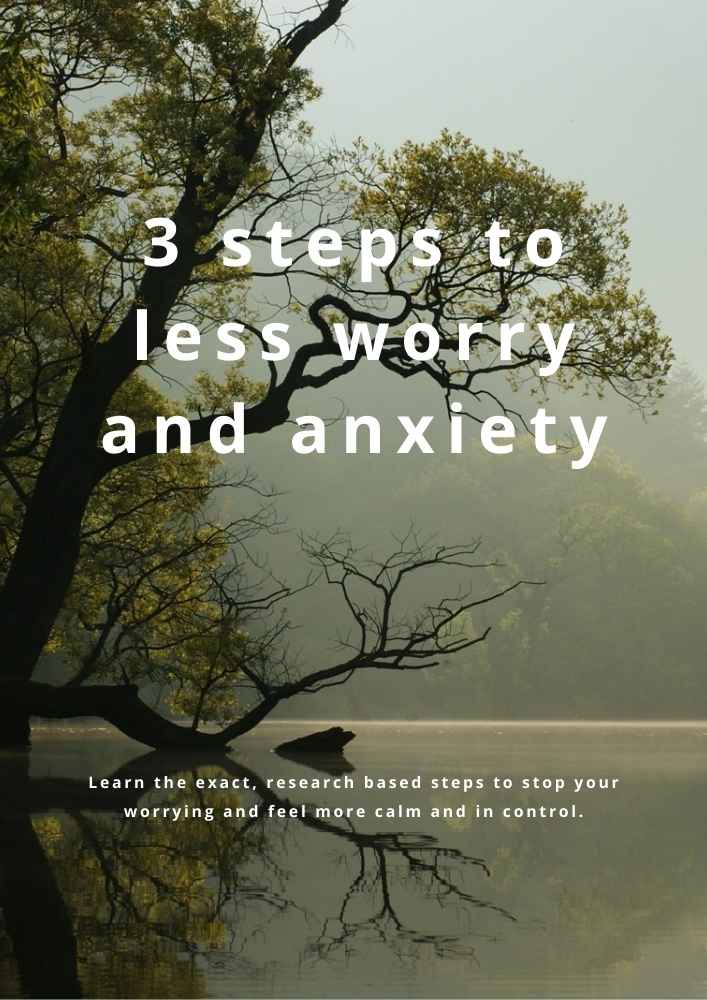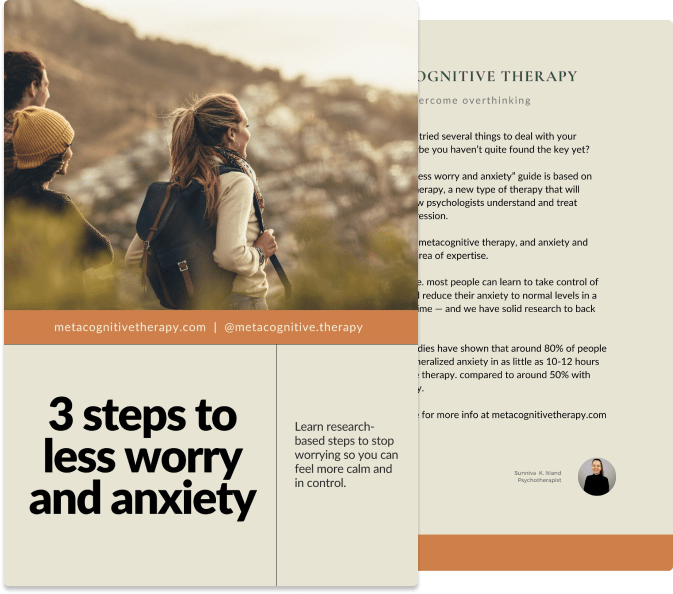Overcome decision-making anxiety with a Metacognitive Therapy approach

Download our best tips on reducing anxiety and worrying
Learn three powerful metacognitive therapy steps to stop the worry cycle, reduce anxiety, and feel calmer in everyday life.
.jpeg)
.jpeg)
We make thousands of decisions everyday—from the mundane to the life-altering, like what job to take, whether to stay in a relationship, where to live.
For some, the decision-making process can be completely overwhelming, filled with excessive worry, uncertainty, and fear of regret.
Metacognitive Therapy (MCT) offers a new and effective way to address this kind of anxiety: instead of analyzing the content of each decision, it helps people zoom out and change how they relate to their thoughts about decision-making.
It’s not about the decision — it’s about your thinking pattern
In many cases, people experiencing decision-making anxiety don’t actually lack decision-making skills. Their distress stems from how they think about making decisions. They often believe that they need to eliminate all doubt before committing to a choice, leading to cycles of overthinking and rumination. Ironically, their fixation on “making the right choice” often results in feeling less certain and more stuck.
This constant overthinking reinforces doubt and insecurity. The MCT approach shows people that more thinking and consideration doesn’t necessarily lead to better decisions — excessive thinking can ultimately undermine your confidence and clarity.

Download our best tips on reducing anxiety and worrying
Learn three powerful metacognitive therapy steps to stop the worry cycle, reduce anxiety, and feel calmer in everyday life.
Common thought and behaviour pitfalls of decision anxiety
Decision-making anxiety often shows up in a cycle of thought patterns and behaviours. These thoughts can sound like:
- “What if I make the wrong decision?”
- “What if I regret this later?”
- “Why can’t I just decide?”
- “What if it doesn’t work out?” This leads to rumination — going over and over past decisions or potential outcomes, fixating on details, exaggerating consequences, or replaying past choices.
Behaviourally, this can result in:
- Procrastinating or avoiding decisions altogether
- Seeking constant reassurance from friends and family
- Postponing plans until a decision is made
- Withdrawing from your usual activities
- Over-researching or overanalyzing all possible outcomes
MCT also helps people shift away from the common belief trap of “right” versus “wrong” decisions. This is binary thinking, when in reality, a decision that seems perfect today might feel like the wrong one next week, and something that feels like a mistake right now could turn out to be the best decision you’ve ever made.
The role of metacognitive beliefs
At the root of these thinking and behaviour patterns are our metacognitive beliefs—our thoughts about thoughts. Metacognitive beliefs direct how you respond to negative thoughts, and research shows that these beliefs are one of the strongest underlying factors in psychological distress.
Metacognitive beliefs that prolong decision anxiety might be:
- “If I think through everything that could go wrong, I’ll make a better choice.”
- “I can’t stop worrying until I’m sure.”
- “If I ruminate enough, I’ll find the right answer.”
These beliefs create a false sense of responsibility to “solve” uncertainty through overthinking. MCT helps you question the usefulness and accuracy of these beliefs: Does more thinking really lead to better outcomes? Has rumination actually helped solve the problem in the past?
Changing your relationship with doubt and regret
Metacognitive Therapy doesn’t try to remove doubt entirely. Doubt is a natural part of life, and it’s absolutely possible to make decisions while experiencing doubt. Instead, it teaches us to live with uncertainty, without letting it dictate our actions. Rather than treating doubt or regret as failure, MCT encourages viewing them as passing thoughts and feelings, not facts.
Imagine standing in front of a dense forest, unsure of which path to take. Instead of thinking endlessly about which trail might be safest or lead to the best outcome, MCT encourages you to simply take a step forward. You might discover the path once you’re inside the forest.
Answers often come through experience, not speculation.
Practically, this could look like setting a time limit for decision-making (for example, one hour a day for two weeks), then committing to a choice and not engaging in any post-decision worries. Doubtful thoughts may arise afterward, but rather than engaging with them, MCT encourages you to use detached mindfulness — the ability to observe triggering thoughts and emotions without trying to 'fix' them. It can also be helpful to practice redirecting your focus away from inner doubt or regret, and outward towards daily activities. Negative thoughts and emotions will regulate themselves if you leave them alone.
Restoring confidence in your decisions
The goal of MCT isn’t to make perfect decisions (there’s no such thing!), it’s to restore confidence in your ability to choose and move forward. We can reduce the cycle of worry and discover that it’s not decision-making itself that’s the problem — it’s the belief that clarity can be achieved through endless rumination.
This one shift helps people step out of indecision and reclaim control over their choices—and their lives.
If you’re ready to stop overthinking, take our quiz to find out how MCT can help you.



